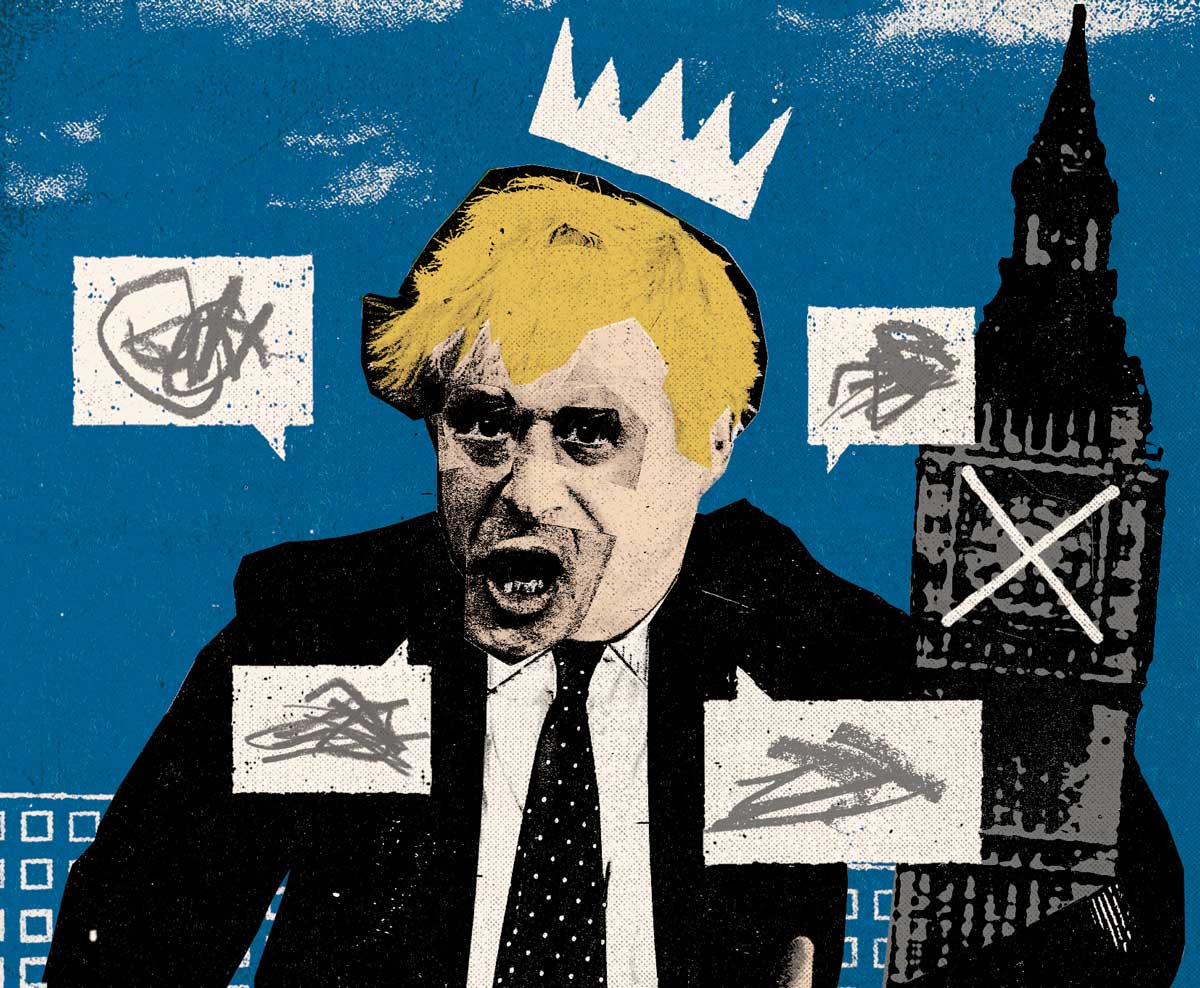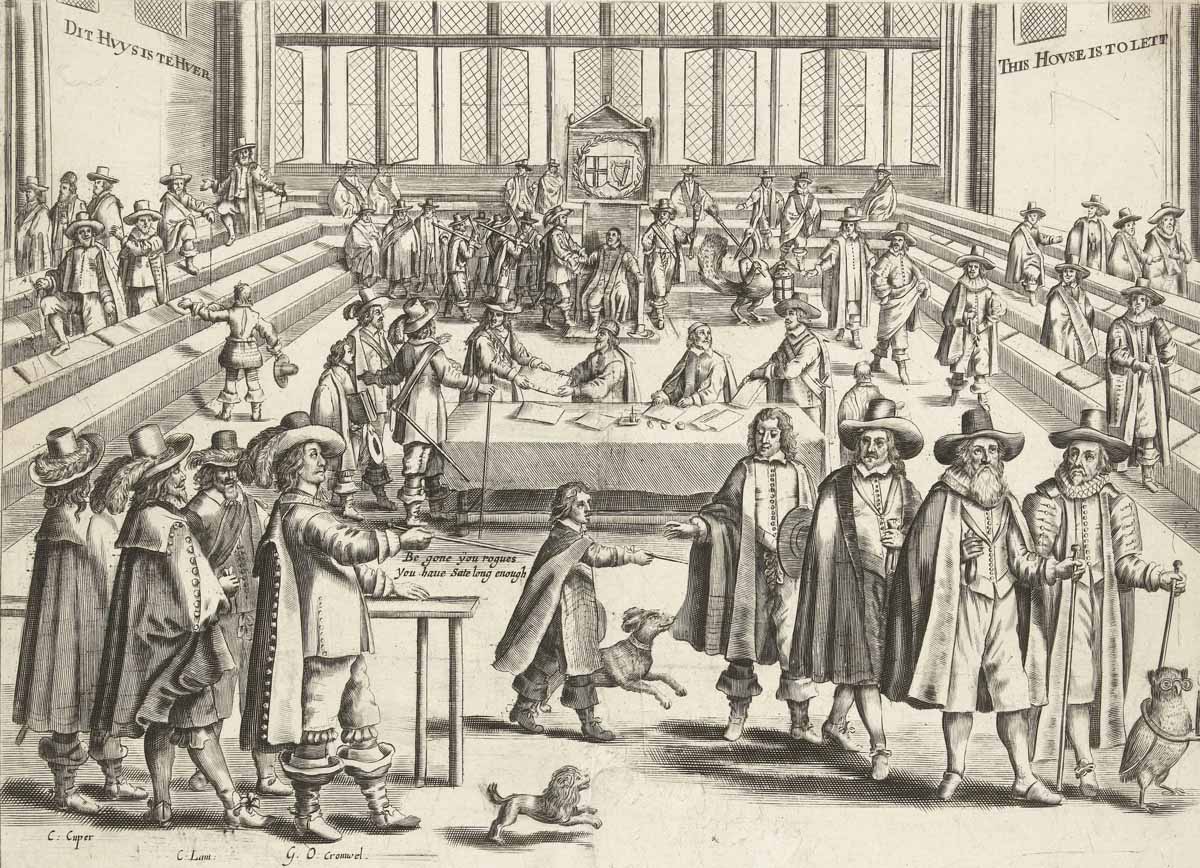A Second British Revolution | History Today - 8 minutes read

On 9 September, as Black Rod entered the Commons to deliver the summons to attend the Lords as part of the prorogation ceremony, a number of MPs attempted to keep the Speaker, John Bercow, in his chair. This action, as the Labour MP Clive Lewis acknowledged, was an imitation of a 17th-century episode: in 1629, members held down the Speaker, Sir John Finch, in order to pass resolutions against Charles I’s religious policies and imposition of taxation without parliamentary consent. The king responded by dissolving Parliament: it would not be summoned again for 11 years.
Following the decision of Boris Johnson to advise the Queen to prorogue Parliament, this was just one of many analogies made with 17th-century England. At the protests that came in the wake of news of the planned prorogation, placards and banners could be seen urging that ‘Charles I didn’t die for this,’ or that England needed a ‘new Cromwell’. A banner held aloft at a protest in Berlin made the political threat contained within this parallel crystal clear: ‘Last time this happened, Cromwell discontinued the custom of kings wearing their heads on their shoulders.’
Yet it was not only the government’s opponents who identified with Cromwell. For many supporters of Johnson, the Prime Minister was also acting in Cromwellian fashion, giving short shrift to a Parliament that was frustrating the will of the people to leave the European Union. Cromwell’s reputed words on dismissing the Rump Parliament in 1653 came to mind: ‘In the name of God, go!’
This was a controversy in which it seemed everyone wanted to be a Roundhead and no one a Cavalier. The Leader of the House, Jacob Rees-Mogg, continued the theme of Parliament obstructing instead of enacting the public will: ‘Sovereignty comes from the people to parliament’, he said. ‘It does not come to Parliament out of a void. We should recognise who are our masters and show ourselves to be their lieges and servants, not their overlords.’
Channelling the Levellers
Here was a Conservative Cabinet minister appearing to channel not Cromwell but the Leveller Richard Overton in his A Remonstrance of Many Thousands of Citizens (1646): ‘We [the people] are your principals, and you our agents; it is a truth which you cannot but acknowledge. For if you or any other shall assume or exercise any power that is not derived from our trust and choice thereunto, that power is no less than usurpation and an oppression from which we expect to be freed.’
In contrast, the Leader of the Opposition, Jeremy Corbyn, who has spoken of his admiration for the Leveller John Lilburne, denounced the prorogation as a ‘constitutional outrage’ and an attempt to ‘ride roughshod’ over Parliament. Corbyn, part of the Bennite tradition in the Labour Party, which had advocated the abolition of the monarchy and House of Lords, became the defender of the constitutional status quo.
Such topsy-turvy constitutional positioning might be seen as just political game playing. Equally, this ideological ‘world turned upside down’ might simply be another symptom of our ‘post-truth’ age, in which misinformation spread through social media has replaced party manifestos and political broadcasts.
Cromwell’s ‘speech’ in 1653 offers a case in point: we have no evidence that he ever uttered the words ‘In the name of God, go!’ They have never been included in the standard anthologies, while the current project led by John Morrill to produce a definitive collection of the Lord Protector’s words has found no reference to this statement in the multiple contemporary or near contemporary renderings of the harangue. Instead, like the phrase ‘warts and all’, it is most likely a 19th-century invention.
But there may be more to learn from the invocation of this fabricated speech than the need to check the provenance of quotations. This is not the first time in recent memory that Cromwell’s denunciation of Parliament has achieved political currency. It previously came to the fore in 2009, during the height of the expenses scandal. The closing peroration attributed to Cromwell was used as the Sun newspaper’s front page headline. Commentators such as Simon Heffer used the speech to argue that expenses cheats should be purged from Parliament and that a general election was needed to cleanse British politics.

It is to this crisis that we need to turn rather than the 17th century to understand the current constitutional predicament. The abuse of the expenses system was undoubtedly serious but a number of figures at the time raised concerns about the strength of the backlash against the political system. The then Archbishop of Canterbury, Rowan Williams, warned with remarkable prescience that ‘the continuing systematic humiliation of politicians itself threatens to carry a heavy price in terms of our ability to salvage some confidence in our democracy’. His analysis was supported by opinion polls around the time of the scandal, which saw a collapse in support for the main parties and a corresponding growth in support for UKIP and the far-right BNP.
Some politicians, such as the Labour frontbencher Alan Johnson, urged that the scandal should prompt a comprehensive review of the British electoral and political system and the leaders of the main political parties made noises in that direction. When reforms were enacted by the Coalition Government, however, these were piecemeal and their ramifications underestimated. In addition to a new parliamentary standards watchdog, the Coalition also introduced other measures intended to make politicians more accountable to the public. In 2011 the parliamentary e-petitioning system set up under Tony Blair’s government was overhauled to ensure that petitions which reached a threshold of 100,000 signatures or more would now have to be debated in Parliament. A ‘Recall Act’ was passed in 2015 which provided a mechanism for constituents to force a by-election where their MP had been convicted of a criminal offence or had been deemed to have provided false or misleading expenses claims. Finally, a series of referendums were held on electoral reform, Scottish independence and, fatefully, the UK’s membership of the European Union.
The public will
These initiatives introduced elements of direct democracy into the parliamentary system, creating an expectation that the public ‘will’ expressed through petitions or referendums should be heeded as much as the outcome of elections. In this context, the repositioning of Rees-Mogg as a Leveller appears much less superficial. The kind of arguments that the Leader of the House and other members of Cabinet have been making, which place the people in opposition to Parliament, are the outcome of those changes: a constitutional revolution has taken place into which the country sleepwalked. The UK’s drowsy shuffle towards the political precipice has been facilitated by a broad antagonism in the last 30 years to ‘ideology’. The ‘Third Way’ of Blair and Brown, which found eager imitators in Cameron and Clegg, eschewed the old polarities of ‘right’ and ‘left’, speaking of ‘values’ rather than principles or constitutional structures.
Though the roots of the current political crisis lie in the recent past, there is still much that could be learnt from reflecting on the mid-17th century. If our political difficulties are a product of the constitutional confusion and ideological fug that has entered British politics over the previous decade, we might benefit from reacquainting ourselves with the last period when the fundamentals of political organisation and representation were discussed so thoroughly. The ‘intellectual creativity’ (a term the historian Mike Braddick thinks captures its ideological inventiveness) of the 17th-century revolution was not restricted to the Parliamentarian side. Some of the most influential works from this period were produced by authors (Thomas Hobbes, James Harrington) whose allegiances had originally lain with the Royalists. Then, as now, the location of political sovereignty was a crucial issue at stake in these debates, yet there was agreement as to what the exercise of sovereignty was for: the public good. The Ciceronian tag salus populi suprema lex esto (the welfare of the people should be the supreme law) was employed by both advocates of absolute monarchy and vociferous supporters of popular government. Hobbes, for example, believed that life under the absolute sovereign described in Leviathan would be far from oppressive, indeed it would be the strength of the sovereign power which would ensure that the people enjoyed their liberty. For others, such as the Levellers, the public good would be defended through a new representative body elected by a broad manhood franchise and by a set of ‘reserves’ (including liberty of conscience and equality before the law) which would be protected from either legislative or executive interference.
In spite of the desire expressed in the Levellers’ ‘Agreement of the People’ for ‘the peace and good of all our countrymen – even of those that have opposed us’, the struggle over these different understandings of liberty would be catastrophic. Thankfully, 2019 is not (yet) 1629 or 1649. Early modern schemes for constitutional reform do not provide ready templates for 21st-century politicians to adopt, nor would any reasonable person want a repeat of the civil wars which generated such profound constitutional change. What these debates remind us, however, is that the energies of the English revolution were constructive as well as destructive. If the UK’s political crisis has been generated in part by an unreflective blending of different democratic forms, rediscovering the intellectual creativity of the revolution may provide a route to recovering our understanding of political first principles and navigating a path out of the current constitutional maze.
Ted Vallance is Professor of History at Roehampton University.